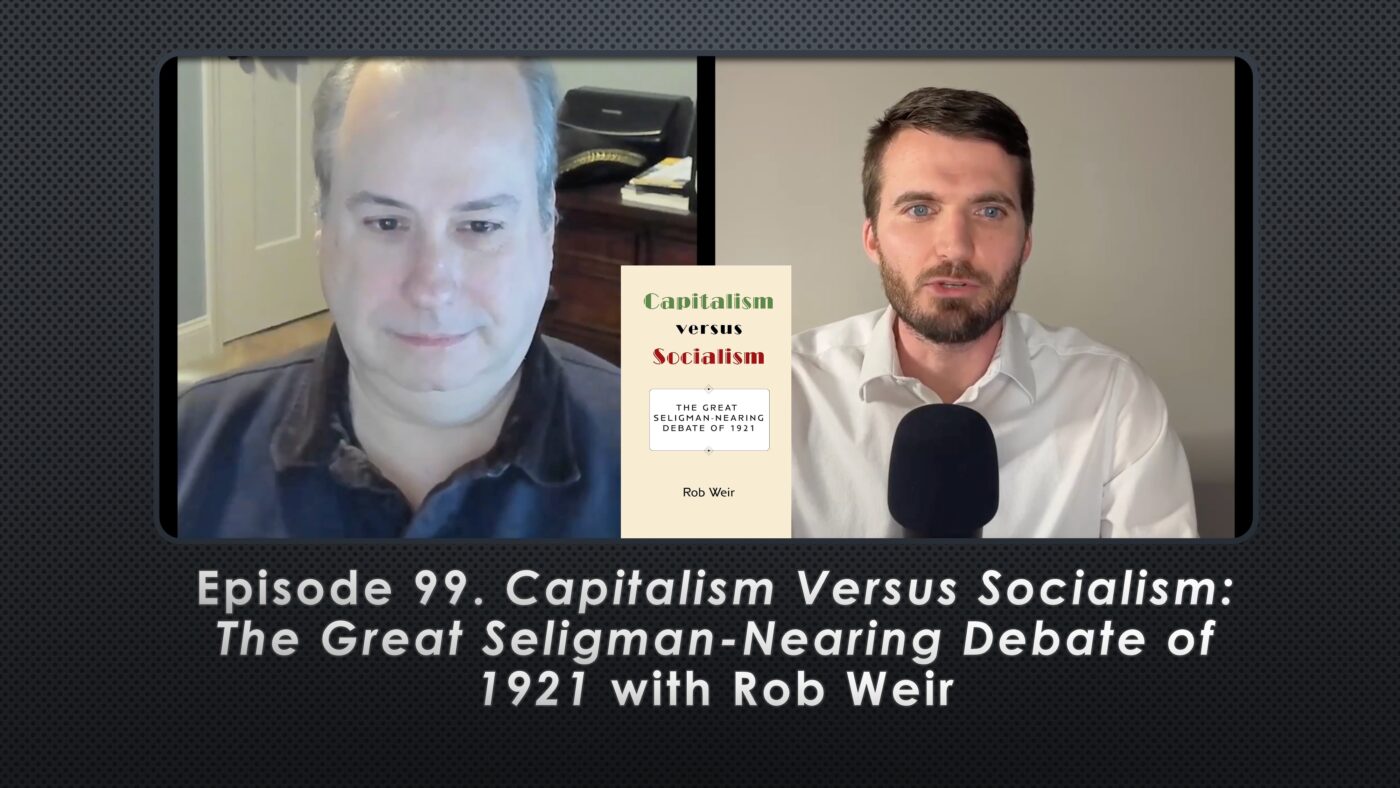Show Notes:
Episode 99. Capitalism versus Socialism: The Great Seligman-Nearing Debate of 1921 with Rob Weir
In this episode of the Forge of Freedom podcast, host Alex Ooley interviews Rob Weir about his book, ‘Capitalism versus Socialism: The Great Seligman-Nearing Debate of 1921.’ The debate, which took place in New York City, featured Edwin Robert Anderson Seligman arguing for capitalism and Scott Nearing arguing for socialism. Seligman’s arguments focused on the benefits of capitalism, such as wealth creation, technological advancements, and individual liberty. Nearing, on the other hand, criticized capitalism for its inherent power imbalance and argued that socialism offered a better environment for workers. The debate took place at a time when socialism was gaining momentum worldwide, and the participants did not have the benefit of hindsight to evaluate the real-world consequences of socialism.
This conversation explores the arguments made in a debate between Edwin R.A. Seligman, a proponent of capitalism, and Scott Nearing, a socialist. The debate covers topics such as the theoretical vs real-world examples of socialism, wartime communism, market failures, capitalism and war, Marx’s iron law of wages, colonial empires, the military-industrial complex, the calculation problem, and the generational debate on values. The conversation highlights the ongoing relevance of these arguments and the importance of understanding and defending economic freedom.
Takeaways
- The Seligman-Nearing debate of 1921 explored the merits of capitalism versus socialism at a time when socialism was gaining momentum worldwide.
- Seligman argued that capitalism offered benefits such as wealth creation, technological advancements, and individual liberty.
- Nearing criticized capitalism for its power imbalance and argued that socialism provided a better environment for workers.
- The debate took place before the rise of Hitler, Mao, and Stalin, so the participants did not have the benefit of hindsight to evaluate the real-world consequences of socialism. Theoretical arguments for socialism often lack real-world examples and fail to consider the practical challenges of implementing socialist systems.
- Wartime communism in the Soviet Union was a brief experiment in idealized communism, but it quickly failed and led to the adoption of the New Economic Policy, which introduced market mechanisms.
- Capitalism and communism have both been associated with instances of starvation and market failures, but the severity and persistence of these issues have been greater under communism.
- The argument that capitalism leads to war is based on the belief that capitalists accumulate wealth and seek to invest it abroad, leading to conflicts over resources and markets.
- The worker as slave argument in socialism suggests that workers are not paid the full value of their labor, but this overlooks the capital investment, risk-taking, and management provided by capitalists.
- The calculation problem in socialism arises from the absence of economic prices determined by supply and demand, making rational economic planning impossible.
- The debate between capitalism and socialism continues to be relevant, with arguments evolving and adapting to new contexts and values.
- Understanding and defending economic freedom is crucial in countering attacks on capitalism and preserving individual liberty.
Chapters
00:00 Introduction and Background
04:59 Discovering the Debate
05:16 Becoming Attracted to Ron Paul
07:45 Mises’ Inclusion of the Debate
08:08 Setting the Stage for the Debate
10:30 The Debaters: Seligman and Nearing
17:02 Defining Capitalism and Socialism
23:32 The Context of Socialism in 1921
28:51 Seligman’s Arguments for Capitalism
31:29 Nearing’s Criticisms of Capitalism
53:23 Theoretical vs Real-World Examples of Socialism
54:13 Wartime Communism and the New Economic Policy
55:22 Capitalism vs Communism: Starvation and Market Failures
56:42 Capitalism and War
57:40 Marx’s Iron Law of Wages and Lenin’s Modification
58:43 Capitalism, Colonial Empires, and Conflict
59:55 Modern Arguments: Military-Industrial Complex and Environmentalism
01:03:26 The Worker as Slave and the Calculation Problem
01:04:07 Seligman’s Response to the Worker as Slave Argument
01:06:14 Voluntary Employment Relationship and Economic Prices
01:08:06 The Calculation Problem and Rational Economic Planning
01:15:08 Attempts to Patch the Socialist Economic Argument
01:17:54 Generational Debate and Disagreement on Values
01:23:52 The Depression of 1920-1921 and the Legacy of the Debate
Resources:
Debating Socialism: The Seligman-Nearing Debate at 100 | Mises Institute
https://mises.org/library/debating-socialism-seligman-nearing-debate-100
Debating Socialism: The Seligman-Nearing Debate at 100 | Mises Wire
https://mises.org/wire/debating-socialism-seligman-nearing-debate-100
Capitalism versus Socialism: The Great… by Weir, Rob
https://www.amazon.com/gp/product/1733897135/ref=sw_img_1?smid=ATVPDKIKX0DER&psc=1
“Capitalism versus Socialism” now Available
https://www.whynotlibertarianism.com/capitalism-versus-socialism-now-available.html
Amazon.com: Rob Weir: books, biography, latest update
https://www.amazon.com/stores/author/B07QWBFZZ5/about
Two Structural Reasons Why Government Fails – Foundation for Economic Education
https://fee.org/articles/two-structural-reasons-why-government-fails/
Rob Weir (@WhyNotLib) / X
What is Libertarianism?
https://www.whynotlibertarianism.com/what-is-libertarianism.html
About “Why Not Libertarianism?”
https://www.whynotlibertarianism.com/about
The appendix to Mises’s “Liberalism” (the first English edition of which was titled “The Free and Prosperous Commonwealth” due to the shift in meaning of the term “liberal” in the U.S.)
https://archive.org/details/freeprosperousco00vonm/page/194/mode/2up
James Grant’s “The Forgotten Depression”
https://www.amazon.com/Forgotten-Depression-Crash-Cured-Itself/dp/1451686463
Jörg Guido Hülsmann’s “Mises: The Last Knight of Liberalism”
https://mises.org/library/mises-last-knight-liberalism-0
That’s the biography that fleshes out Mises’s life in Vienna, in part from material in Russian archives.
Mises’s “Economic Calculation in the Socialist Commonwealth”
https://mises.org/library/economic-calculation-socialist-commonwealth
The Lange–Lerner approach, the main response from socialists to Mises:
https://en.wikipedia.org/wiki/Lange_model
Rawls’s “Difference Principle”
https://en.wikipedia.org/wiki/Justice_as_Fairness#Difference_principle
Nearing’s pamphlet, “The Great Madness: A Victory for the American Plutocracy”
https://babel.hathitrust.org/cgi/pt?id=umn.31951002333233k&seq=3
This is what got him indicted under the Espionage Act.
Tags:
#freedom
#liberty
#capitalism
#socialism
#Marx
#communism
#markets
#peace
#prosperity
#voluntaryexchange
#voluntaryism
#corporatism
#industrialization
#FDR
#greatdepression
#NewDeal
#war
DISCLAIMER: This podcast is for informational purposes only and should not be considered legal, medical, or financial advice. The views expressed in this podcast are those of the hosts and guests and do not necessarily reflect the views of any organizations or individuals they may mention. The hosts and guests are not liable for any damages that may result from someone listening to this podcast.

